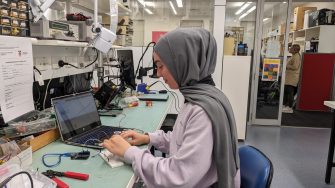Using engineering to fix a broken heart
UNSW engineering student says she loves the hands-on experience Vertically Integrated Projects offer.
UNSW engineering student says she loves the hands-on experience Vertically Integrated Projects offer.

With more and more people suffering from heart failure and fewer transplantations, the need for an artificial heart is greater than ever.
Joanne Zreika, along with her peers across UNSW Engineering and UNSW Medicine, are putting their problem-solving skills to the ultimate test. They’re designing and building the a ‘Total Artificial Heart’ as part of the International Society for Mechanical Circulatory Support ‘Heart-A-Thon’.
I’m in my 3rd year studying mechanical and biomedical engineering. To me, this degree is the perfect blend of the humanity of medical studies and the innovativeness of engineering. I am very passionate about all the projects I’m able to work on as a student under this degree program which have each given me a glimpse into what it takes to create invaluable technological devices to solve pressing issues.
This year I am part of the Mending Broken Hearts team where our goal is to create a Total Artificial Heart (TAH) as the official UNSW entry into the international 2023 Heart Hackathon. I love seeing the team’s progress and reflecting on how it was only last term when we held concept generation workshops and had mere sketches at hand and now we’ve starting making models and creating circuits for our prototype and seeing everything come together.
I have also enjoyed all the new practical skills I’ve been developing such as soldering and running the mock circulatory loop (mimics the entire human cardiovascular system!) – both of which I probably wouldn’t have otherwise.
To be completely honest, I was initially attracted to the fact that a VIP could count as an elective towards my degree. While I am involved in multiple extra-curriculars to which I am just volunteering my time, I appreciated how the time I spend on my project will be acknowledged as coursework without the added stress of exams, tests and studying overall.
Furthermore, I appreciated the multi-disciplinary teams that are formed under VIP. Throughout our degrees it’s a safe assumption that we will be working with peers in the same program as us, and hence, are not aware of what it would be like to work with other-minded people. My team for example boasts an amazing range as we have engineering students across 3 disciplines as well as medical science and medicine students. Working in this diverse team has allowed me to be more open-minded in general and refine the soft skills required when interacting with people from a different background/ completing different tasks.
Admittedly, this one took me a while to completely internalise but most of the time we have to be the ones to take initiative and be prepared to delve into the research since our supervisors won’t have the answers either! As students we are used to forming questions that our professors have the answers to. In research and VIP this is not the case. It is also not uncommon for there to just be no answer so I’ve had to learn to recognise when it’s time to redirect and think of a new approach.
VIP has given me a taste of what it would be like to work on a real-life engineering problem after graduation. All the VIPs on offer have a touch of realism that isn’t often present in other projects we might complete as part of our coursework. In addition to working on the problem itself, students can expect to be exposed to budget planning, discover the best way to go about outsourcing materials if required, complete inductions to use lab equipment that are usually reserved for PhD/research and perfect their public speaking/ pitching skills – all of which are critical in the formation of an all-rounded engineer.
Apply to enrol in Mending Broken Hearts or one of our other Vertical Integrated Projects on offer.